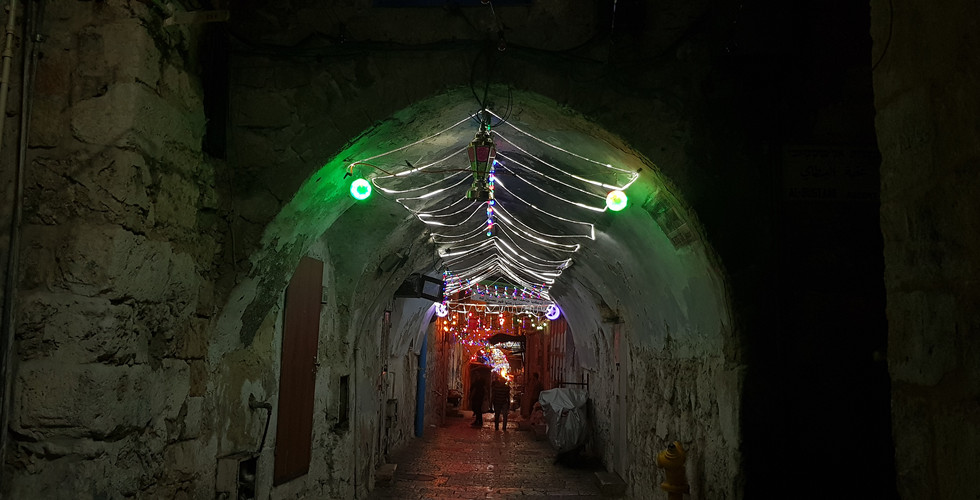The Spirit of Ramadan in Jerusalem
- Alex Zaprudsky

- Apr 13, 2020
- 3 min read
Updated: Apr 18, 2020
As a tour guide who lives in Jerusalem, I am fortunate to get to see the city transform from season to season as the various holidays for the three different monotheistic religions arrive. One of my favorite areas of Jerusalem to visit is the Muslim Quarter in the Old City and the neighborhoods just beyond the Damascus Gate on Sultan Suleiman Street. There’s just something about the colors of the markets, the smell of the kebab grilling, the hum of the Muazzin making the call to prayer periodically throughout the day, and the general hustle and bustle that energizes me. Throughout the year, these neighborhoods are quite special, however, during one month every year, they become even more special, as the Muslim holy month of Ramadan arrives.

Celebrating Ramadan is actually one of the five foundational pillars of Islam:
Declaration of Faith (Shahada)
Prayer Five Times a Day (Salat)
Giving Charity (Zakat)
Fasting during the month of Ramadan (Sawm)
Making a pilgrimage to Mecca (Hajj)
Ramadan for the year 2020 starts on the evening of Thursday, April 23rd lasting 30 days and ending at sundown on Saturday, May 23.
During the month of Ramadan, Muslims fast from sunrise to sunset - observant Muslims cannot eat, drink, smoke, have sex, as well as a few other prohibitions. You can imagine that this is quite challenging, especially when Ramadan falls in the heat of the summer - where in Jerusalem it can reach more than 35º C! Since the Islamic calendar is lunar, the Muslim holidays do not occur in a fixed season. This year, Ramadan starts April 23 (or according to the moon) and will end on May 23.

During the Ottoman period, a cannon was fired as the sunset to announce that the fast was over. Today, the same family appointed by the Ottomans 13 generations ago, the Sandouka family, still marks the end of the Ramadan fast by setting off a noisy "firework".
You will notice that the streets in these neighborhoods empty as sunset approaches. This is because Muslim families are preparing for Iftar, the meal Muslims enjoy to break the fast. This is a daily occurrence with many traditional foods and beverages.

According to Islamic tradition, the Prophet Mohamed broke his Ramadan fast by eating a date. Jericho dates are the most popular in Jerusalem. Today, many sweets are enjoyed as treats to break the fast including knafe, baklawa, and a’wameh (the little syrupy doughnut balls).

During Ramadan, a special pastry finds its way into Muslim Quarter bakeries - katayef. Katayef is a pancake-like pastry, filled with either cheese or nuts, folded in half and crimped shut, and soaked in sugar syrup.
You can imagine that after a full day of fasting a person would get mighty thirsty. You are absolutely right. After chugging some water, Muslims have a collection of thirst-quenching beverages that accompany the Iftar dinner. Tamarind juice is a very popular, sweet and sour drink that is sold around the city - on a hot day, this is one of the best ways to cool off. Other popular soft drinks include lemonade, almond juice, carob juice, and Erk sous – a licorice-flavored beverage.
Perhaps my favorite part of Ramadan in Jerusalem is that the streets of the Muslim Quarter are decorated with colorful lights. Ramadan is considered to be the Muslim “festival of lights” since Muslims from around the world unite in a period of fasting and spiritual reflection. The decorations in the Old City are modest, yet the lights add a charm to the neighborhoods.
Muslims from around the world come to celebrate Ramadan in Jerusalem because Jerusalem was considered Islam’s first qibla (direction of prayer) before Mecca. Even though this year Ramadan will be quite different in Jerusalem and around the world, for that matter, I know that eventually, our world will return to normal (even if it is a new type of normal), and the city of Jerusalem will return to its vibrant, colorful, noisy, magical self.
About the writer, Alex Zaprudsky:
Alex Zaprudsky is a licensed tour guide based in Jerusalem. He loves to share the history and traditions of Israel through the flavors, smells, and sounds of the various cultures. You can contact him at www.alexinisrael.com, www.facebook.com/alexinisrael, or www.instagram.com/alexzaprudsky.












Comments